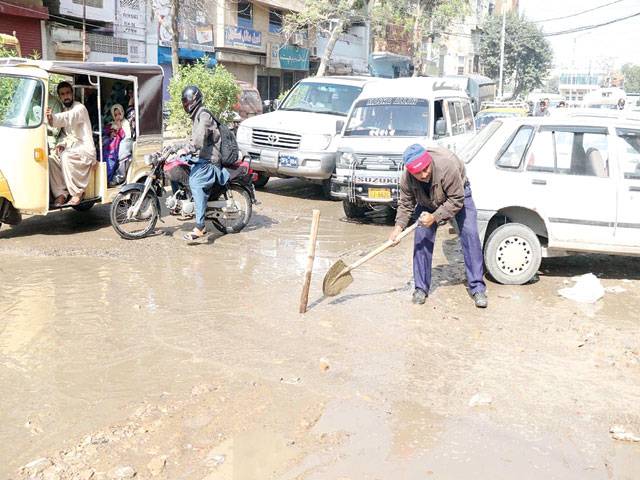KARACHI - Failure of the municipal authorities to remove dirt from the key arteries of the port city after Saturday’s rain has exposed people to various diseases.
After the first rain of the winter in the city that started on Friday afternoon and continued into Saturday, people suffered due to broken roads and dirt, which had accumulated there.
Local government authorities, including the city mayor, are claiming that the city will be cleaned soon. A 100-day drive has been initiated to clean Karachi and claims are being made about success of this drive. However, these claims have yet to be materialised on the ground despite passage of 47 days because heaps of garbage can be seen in every part of the city.
Residents of Karachi welcomed the 100-day campaign launched by Mayor Wasim Akhtar in three districts of the city. It was believed that Akhtar and his team would bring at least a little change in the city.
The city of Karachi is facing problems relating to solid waste management. Some non-government organisations and civil society activists used different ways to make the government realise the gravity of the situation.
Heaps of garbage can be seen on the streets and even on the main arteries of the city and authorities are not paying any attention to this problem. Citizens complained about increasing infectious diseases due to an increase in pollution in the city.
Experts believe that launch of the 100-day cleanliness campaign is just a political ploy, as it is not possible to properly dispose of 12,000-ton garbage produced by the city on a daily basis in just 100-days.
It is however possible to dispose of this quantity of solid waste by launching a massive campaign and allocating additional funds for it. People have have no hope from the government and the pollution level in the city has gone up.
When contacted, KMC Municipal Services Senior Director Masood Alam told The Nation that the ongoing 100-day drive was aimed at lifting garbage from the city on priority because it was a burning issue of the city. Cleaning of roads was also a priority, he said.
He said that nine out of 16 road sweeping machines had been handed over to district municipal corporations (DMCs) and the remaining were being repaired and would be in working position soon.
He said that DMCs were responsible for cleanliness in their areas. He said that KMC was supporting the ongoing cleanliness drive. He said the 100-day drive was only a political slogan because it was not possible to lift all garbage from the city and make it a shining city within 100 days. “Municipal authorities are facing various hurdles, especially a lack of resources and powers,” he said.
Alam said that he informed the Karachi mayor at the first meeting that city’s issues had multiplied after 2010. He said that various departments were not able to resolve city’s issues due to limited resources.
About a lack of cleaning work on the city roads, he said that various roads were being cleaned such as Shahrah-e-Faisal and Shaheed Millat Road because no construction work was under way there. He said that KMC had tried its best to give a pollution-free environment to people despite limited resources, but it was impossible to do so in a short time. He said that people would dig up roads, including main roads, but nobody would stop them from doing so.
Dr Qazi Mujahid Ali told The Nation that the dirt had badly affected the human health, especially asthma patients. He said that various eye diseases also spread due to the prevailing pollution in the city. He said that dust had affected eye lenses of people, especially youngsters and children. The doctor suggested that people should take care and protect themselves from the prevailing polluted environment.






